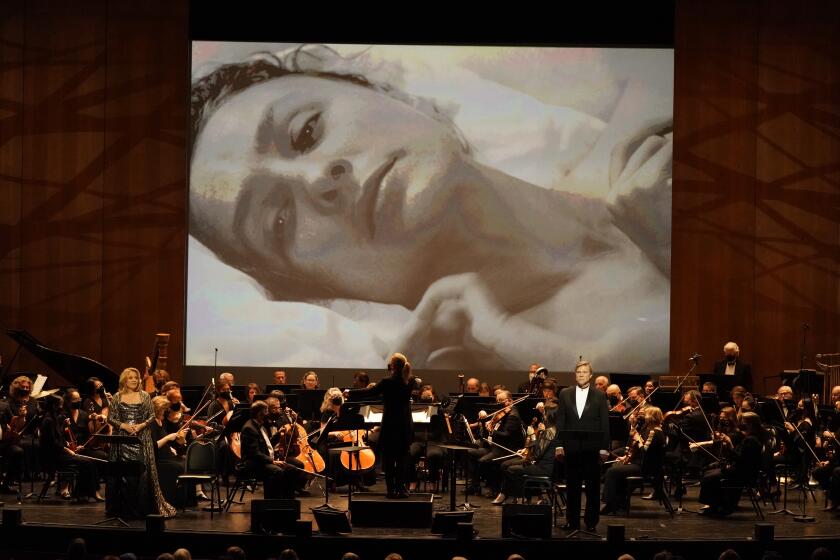Long Beach Opera’s endearingly messy, profound ‘Romance of the Rose’ is an operatic triumph
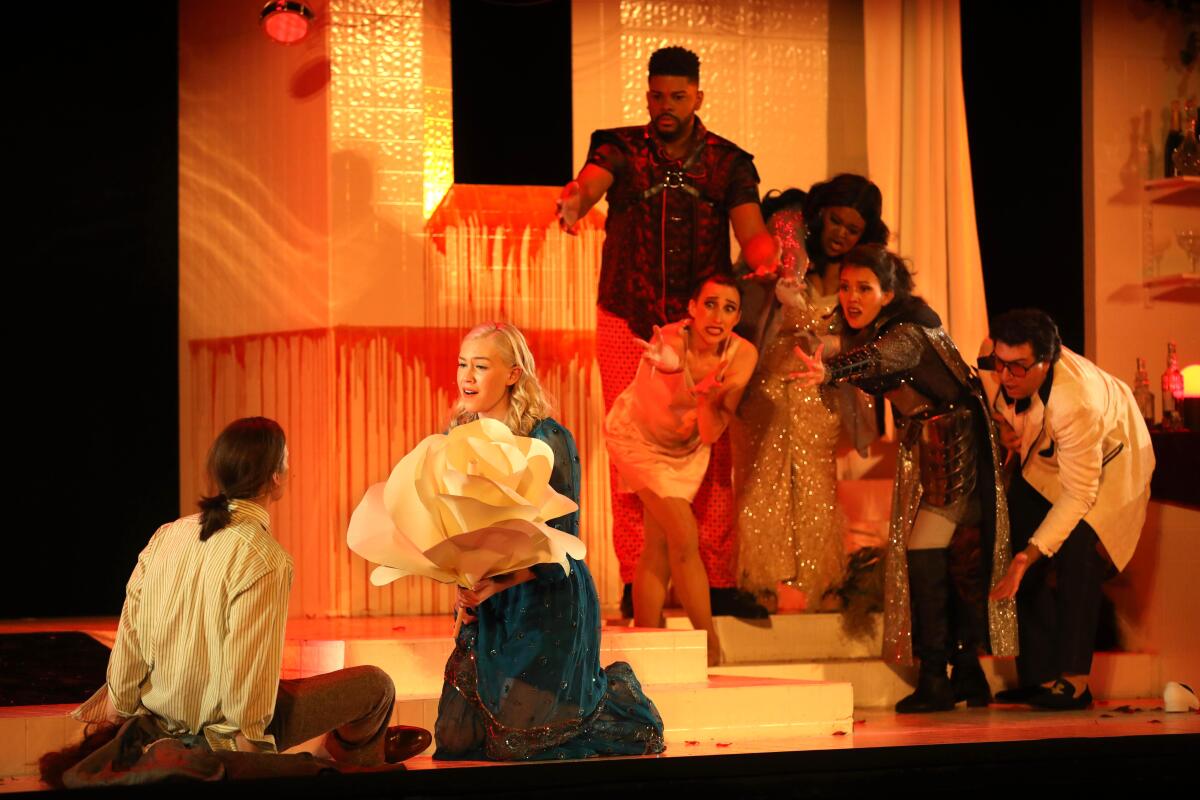
- Share via
In a short program note for “The Romance of the Rose,” given its world premiere by Long Beach Opera over the weekend, the composer Kate Soper suggests that opera “is a good receptacle for the messy complexity of the human condition in general.” So is, as she notes, love. And so, to be very sure, is her endearingly messy but profoundly thought-through new opera.
“The Romance of the Rose” is a riotous jumble of love-talk about — again in Soper’s words — “gender, astrology, fashion, war, law, God, the nature of language and the concept of free will.” Her starting point and obsession was the 13th century epic Old French poem “Le Roman de la Rose,” which questions the meaning of love along with everything else under a sun still thought to revolve around the Earth. Her ending point, in her own brilliantly literary libretto set to her brilliantly head-spinning mix of musical elements, is a flabbergasting commentary about a protagonist who falls head-over-heels in love with a rose.
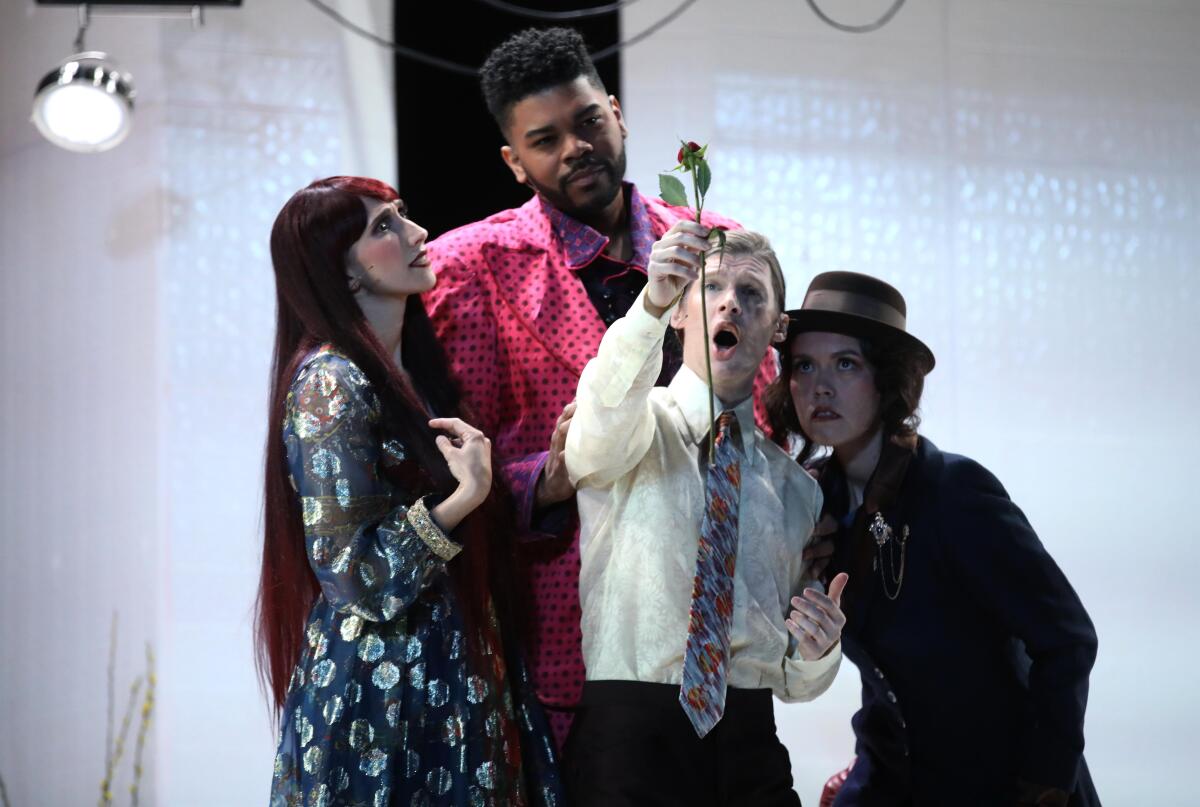
Coupled with a terrific performance by Long Beach Opera that includes more than one star turn, the dowdy Warner Grand Theatre in San Pedro became the unlikely locale for a double operatic triumph.
The first triumph was obviously that of Soper. For the past dozen years, she’s been writing provocative music theater that doesn’t quite fit in any genre and that certainly doesn’t align with the current fashion of go-for-the-gut, conventional-narrative modern opera. She seeks out, instead, the other places in our psyches all too easily ignored.
The second triumph is for Long Beach Opera. A year ago, the company was grappling with scandal and troubling allegations, and seemingly had lost its way. What LBO was able to salvage in a truncated season proved exceptional, but not enough to forecast the future. The premiere of “The Romance of the Rose” launches the company’s first full season under Artistic Director James Darrah, who also directed the production. LBO is back, not only reinventing opera but also itself.
To leave the theater dazed by a new opera — that operates on several topsy-turvy levels at once propelled by nonstop invention — is one thing. To be still processing where the humor ends and the meaning begins, even after time to reflect, is another much rarer and more valuable thing.
In a weekend of opera based on real life, LBO offered ‘Central Park Five’ and L.A. Opera introduced ‘Brightness of Light’ about Georgia O’Keeffe.
So, what exactly is “The Romance of the Rose”? There is no easy answer.
In “Le Roman de la Rose,” a lover pursues a a beautiful woman in an enchanted garden. He is pierced by an arrow from the bow of the god of Love, causing his senses to become overwhelmed by a rose. The Lover then finds himself in the company of allegorical figures — among them Danger, Slander, Fear, Honesty, Pity, Jealousy, Reason, False Appearance and Forced Abstinence — who project their competing attitudes and approaches onto the essence of love.
The authors of “Le Roman de la Rose,” Guillaume de Lorris and Jean de Meun, worked independently, 45 years apart and in different styles to write the poem’s two parts. Soper continues the additions in her marvelously intricate libretto with further texts by Shakespeare, Tennyson and Christina Rossetti. Casting her net impossibly wide, Soper has described further influences that go back to Ovid and include “The Many Ailments of Clover” from the 1953 Yearbook of the U.S. Department of Agriculture. She further peppers the libretto with her own quizzical responses. Every question leads to another.
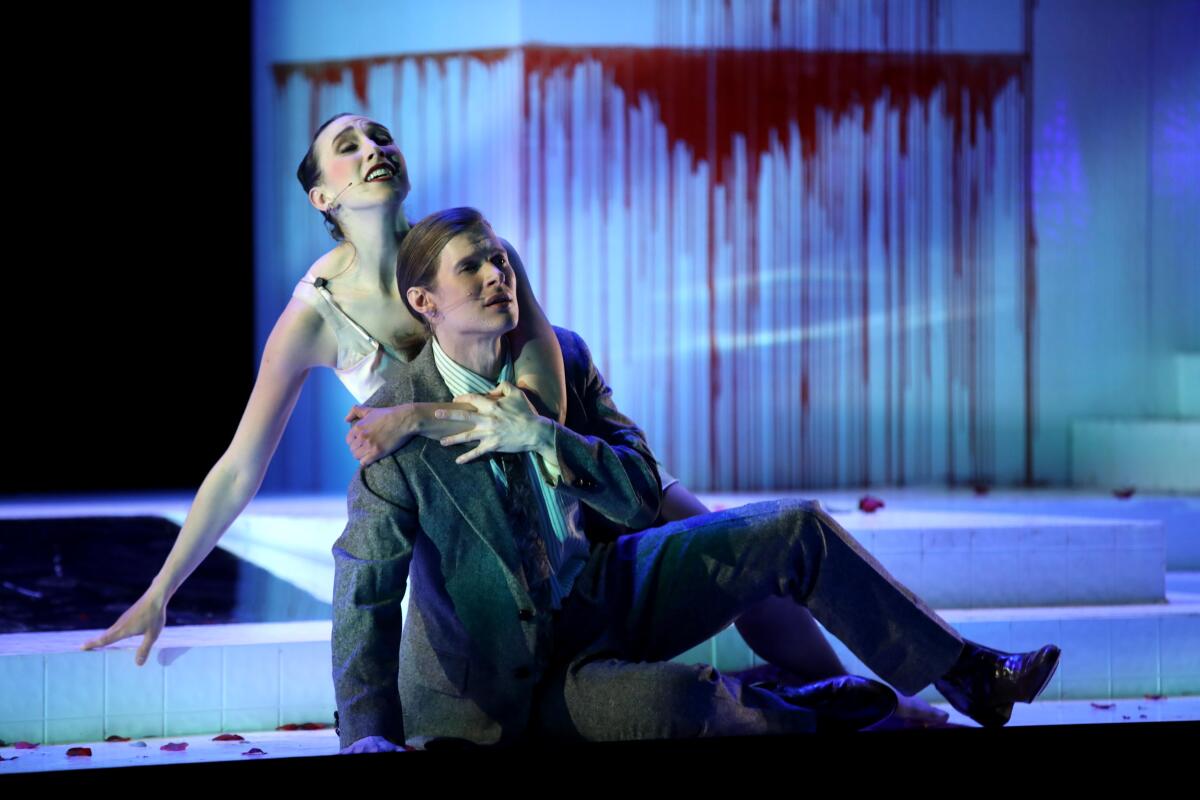
The poem’s narrator becomes the Dreamer, who serves as a kind of master of ceremony. Wanting audience participation, he plucks a supposedly unsuspecting person from the auditorium: the Lover, whom Soper makes a woman and a mezzo-soprano who discovers that she has a great voice. Retained from the original poem are the God of Love, Lady Reason, Shame, Idleness and Pleasure. Each becomes an extravagant operatic character, doing their own updated allegorical business in the dream garden.
That garden in this production (designed by Prairie T. Trivuth) is a modern, minimalist contemporary setting, versatile enough that it can be temporarily turned into a bar when needed. Darrah’s production is relatively straightforward, eschewing use of video or anything extraneous. It relies on imperturbable singing actors, Molly Irelan’s fanciful costumes and Soper’s wildly variegated score create an exultant excess of weirdness.
Soper created the Dreamer for Lucas Steele, a noted Broadway performer (“Natasha, Pierre, and the Great Comet of 1812”), and he is stellar in his first opera role. Steele plays a welcomer, whisking us into a dreamworld of “flimsy doublespeak” and “artful lies” where Henry Purcell and Stephen Sondheim musically walk hand in hand, along with screaming pop and all manner of electronic distortion and enhancement. Soper is not the first to connect the dots between early music and now, but she does so here with an underlying analytic integrity that is both musically exciting and theatrically fulfilling.
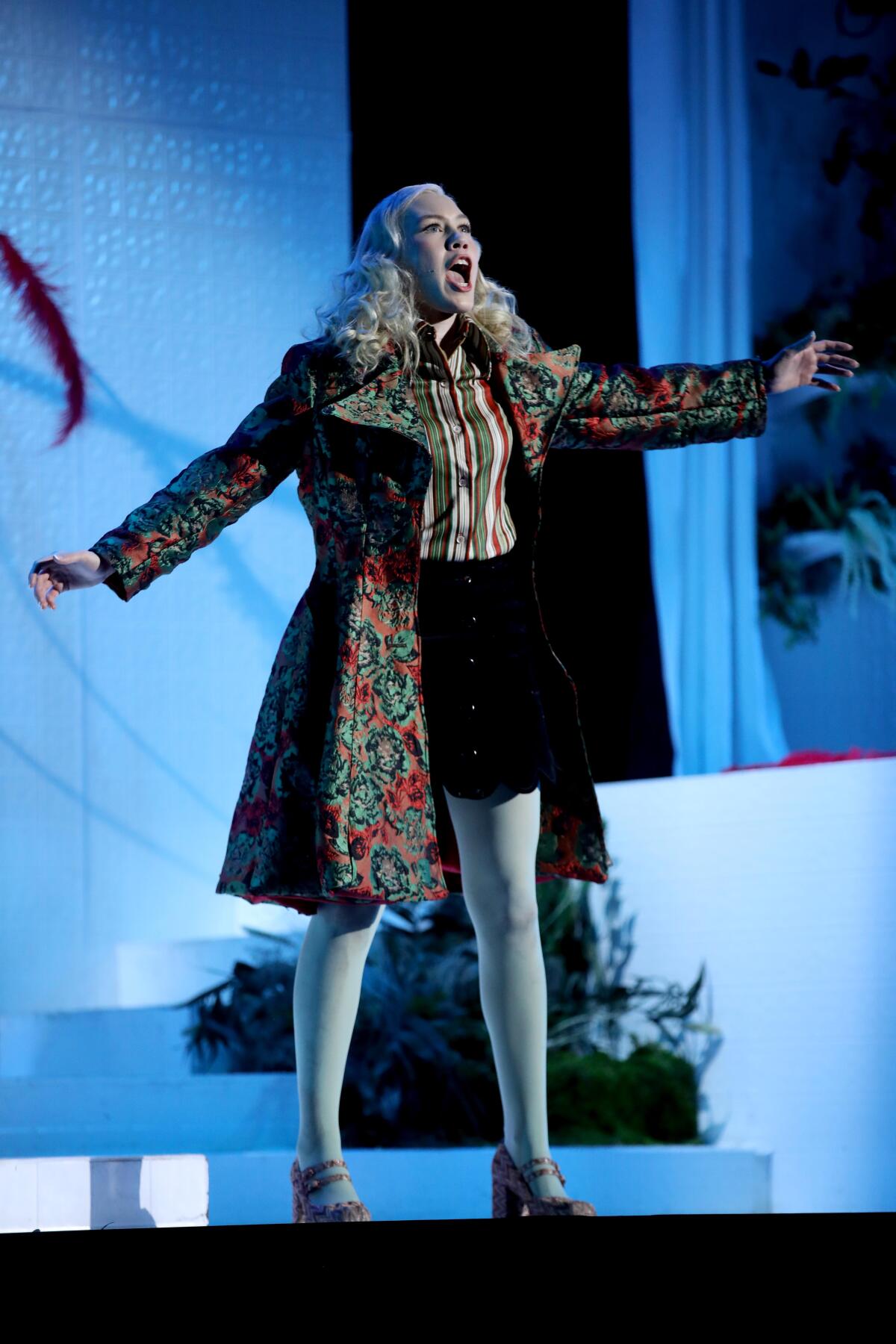
The Lover is a character in Alice in Soper’s wonderland, faced with all the maddening complexities of modern love. Tivoli Treloar, a 21-year-old undergraduate in UCLA’s opera program, superbly inhabits the stage like a veteran in her extraordinary first professional starring role. She commands an epic part, exuding a confidence attained through song, operatic aria and extended avant-garde vocal practices. The premiere of “Rose” was Saturday night. Rather than allowing the singers the couple days of rest their voices need, the second performance was a matinee less than 24 hours later. I attended that matinee, and Treloar‘s voice remained fresh and gleamed.
Soper’s garden would have amazed Kafka. Anna Schubert, the prim and proper Lady Reason, skeptic of everything fanciful love offers, falls for the Lover and loses all reason. A snarky, furious Shame is sung by Laurel Irene, the spectacular star of Soper’s one-woman short opera, “Voices From the Killing Jar,” which Long Beach Opera presented in 2021. Phillip Bullock, a baritone with a striking falsetto, presented the God of Love as evil genius setting the whole thing in motion for his own amusement. Idleness (Tiffany Townsend) and Pleasure (Bernardo Bermudez) entertain as amiably self-centered lounge singers.
That oversimplifies things greatly. Soper’s poetic and philosophical references intermix galore, and much of it flies by so quickly and so strangely that you begin to wonder whether you heard correctly. Amid this bounty of musings, Soper, who takes nothing for granted, even includes amusing asides about the nature of the musical forms she uses. The iridescent, nine-member ensemble in the pit, enthusiastically led by Christopher Rountree, is its own multihued sonic garden. Instruments support the singers, accompany them and even stalk them by doubling their lines. Meanwhile, live electronics color or happily distort all they sonically touch, often giving the cast magical transformative powers.
Black artists citing ‘racial tokenism’ quit Long Beach Opera, one of many arts groups nationwide facing scrutiny over their commitment to inclusion.
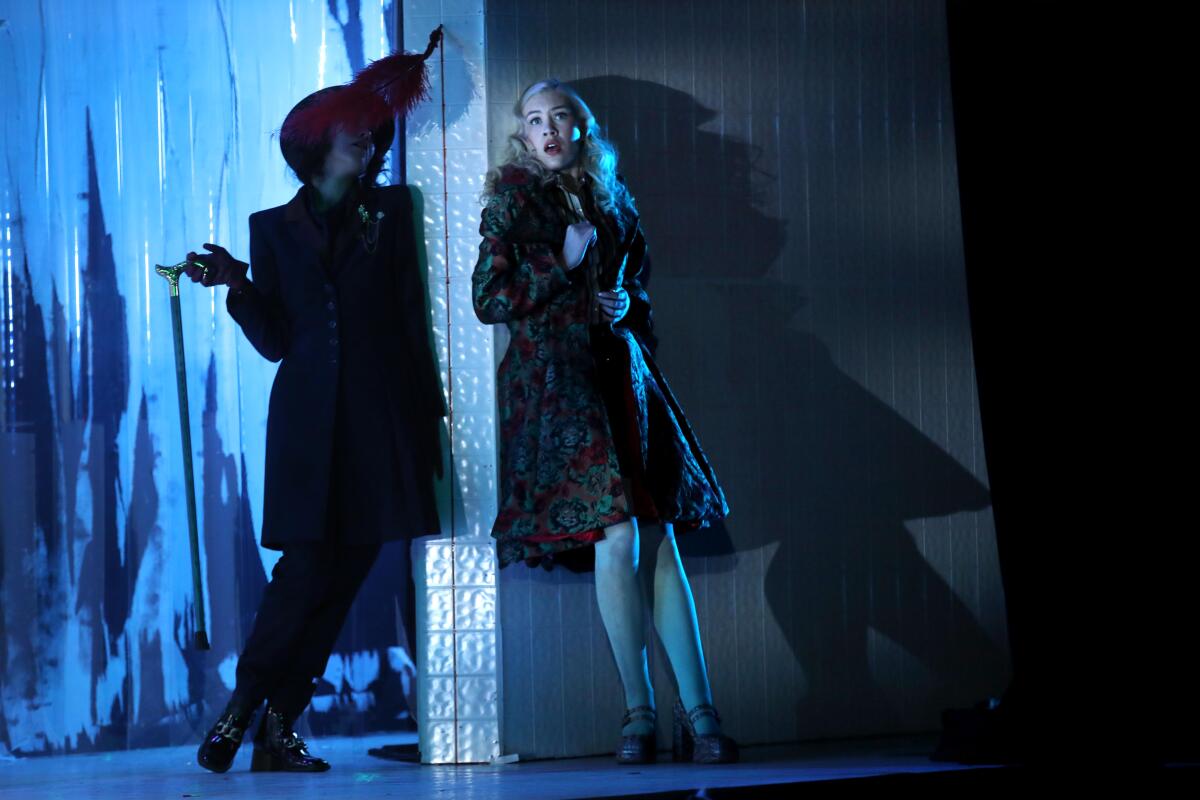
The opera proper ends with a wondrous epilogue. The Lover, while looking in the mirror, embodies an Isolde-esque understanding of love as fable and reality, as sleep and wakefulness, as capable of clarity and disguise. The others warn her that wherever you look, your illusion looks too. At her most magnificent, Treloar embodied illumination that ran through the voice and body, as though she were conducting the universe. It then faded into white noise, the encompassing sound that contains all frequencies.
Soper’s one misstep is not trusting this marvelous and mysterious ending, allowing opera to leave us in a state of heightened awareness. Instead she tacks on a second epilogue, this one spoken and pedestrian, that brings us back to commonplace reality with a clichéd awakening. We need no reminder of rude awakenings; they’re already awaiting us as we exit the theater.
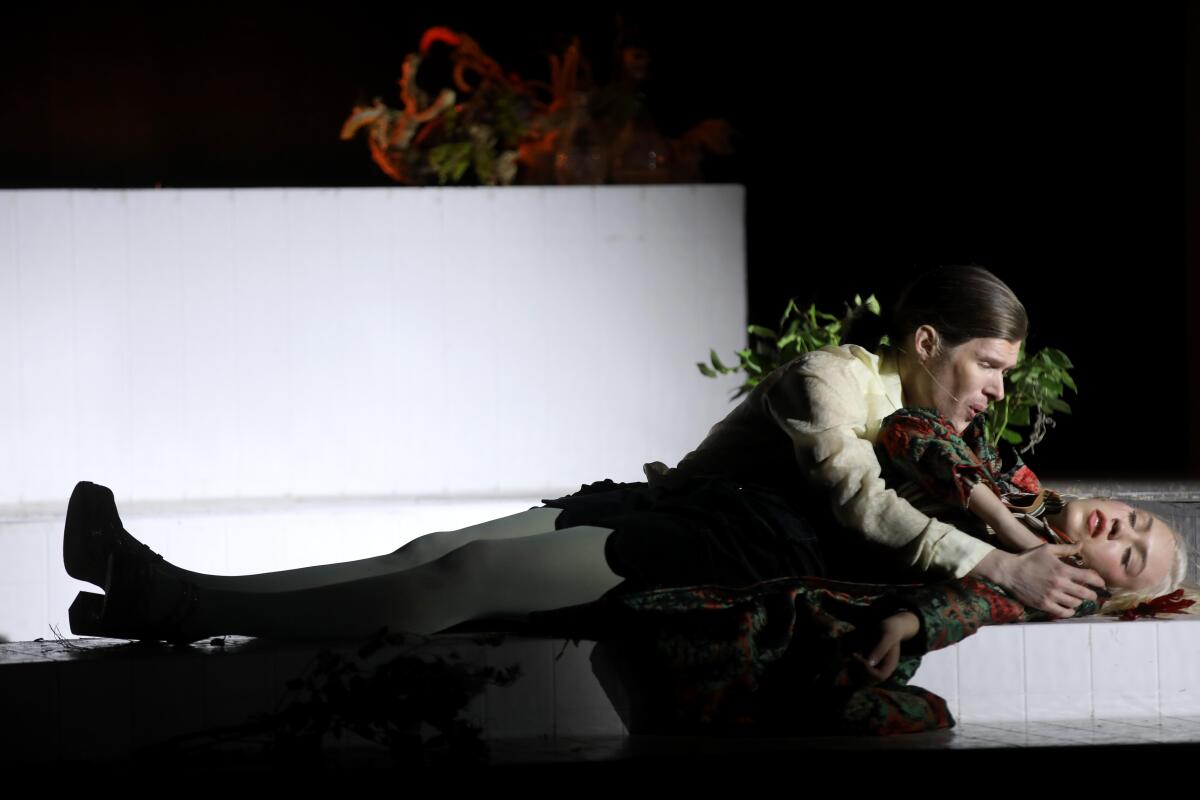
'The Romance of the Rose'
Where: Warner Grand Theatre, 478 6th St., San Pedro
When: Saturday, 7:30 p.m.
Pricing: $35-$165
Running time: 2 hours and 40 minutes, including one intermission.
Contact: longbeachopera.org or (562) 470-7464
More to Read
The biggest entertainment stories
Get our big stories about Hollywood, film, television, music, arts, culture and more right in your inbox as soon as they publish.
You may occasionally receive promotional content from the Los Angeles Times.
